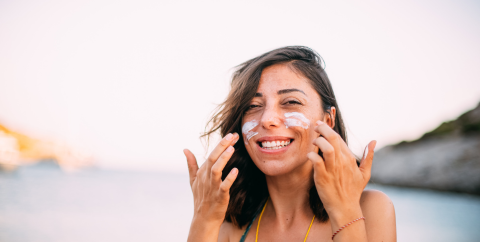UNLV Med Students Partner with Thomas Dermatology For FREE Skin Check Event Aug. 11
07 July, 2025
An estimated 200 people can get free skin cancer checks at a free skin check clinic Aug. 11 at the Durango Hills YMCA at 3521 N. Durango Dr. The community event runs from 5-8 p.m. and anyone is invited to attend, especially those who don’t have health insurance or can’t normally take off work to go to the doctor.
Local dermatologists from Thomas Dermatology will provide skin checks at the event on a first-come, first-served basis. If a skin cancer or other suspicious lesion is found, a team on-site will assist individuals to get follow up care. Similar skin check events in Reno have resulted in skin cancers identified in more than a dozen individuals.
The event is being organized by UNLV medical students Emily Ames and Maggie Sanders, both of whom share an interest in skin cancer prevention and early detection. Last year, the pair organized a campus-wide sunscreen drive to gather donations of sunscreen which they donated to Nevada Cancer Coalition. The nonprofit then distributed the sunscreen to elementary school students in underserved communities through its Sun Smart Schools program.
“Anyone who has skin can get skin cancer, and with the amount of sunshine we have in the Las Vegas region, we have a little higher risk of developing skin cancer if we’re not extra vigilant with sunscreen or other preventive measures,” Ames said. “This year we wanted to take things a step further and help people who may not have access to skin cancer screening to get a free skin check.”
Skin cancer checks performed by a dermatologist can help to spot abnormal growths and cancerous lesions early when they’re easier to treat.

Nevada Cancer Coalition has hosted similar events in Reno with support from medical students at University of Nevada, Reno. The organization will be joining Ames, Sanders and the dermatology team to assist with the event. YMCA has donated space for the event.
"We are so impressed with the initiative Emily and Maggie have taken to support community health and promote skin cancer prevention and early detecton," said Nevada Cancer Coalition’s Prevention Programs Manager Lily Helzer. "This effort reflects our larger mission to engage community partners in meaningful work to reduce the burden of cancer in Nevada."
Those who attend should wear loose-fitting clothing so doctors can easily check sun-exposed skin, such as the neck, arms, legs, and back. Organizers encourage those who work or spend a lot of time outdoors, such as landscapers, first responders, construction workers, and outdoor athletes, to attend. However, anyone who hasn’t had a skin check or has a spot they’d like to check out should also attend the event.
Depending on how many people come to get checked, registrations may end at 7:30 p.m. so doctors can wrap up the final checks before the event ends.
Preventing Skin Cancer
In addition to wearing a broad spectrum, SPF 30 or greater sunscreen, people can reduce the risk of skin cancer by:
- Wearing sun protective clothing such as long sleeves and pants.
- Adding sun-smart accessories like a wide-brimmed hat to protect the scalp, ears, nose, neck and shoulders, and wearing UV-protective sunglasses.
- Seeking shade during peak sun hours, generally from 10 a.m. to 4 p.m.
- Avoiding tanning beds. Tanning beds are NOT safer than the sun and in fact are much more dangerous. Indoor tanning emits UV radiation in amounts 10-15 times higher than the sun at peak intensity.
What to Look For
Nevadans can perform regular skin checks on themselves by looking at all areas of their skin (a mirror and a partner are always helpful with this) to look for any changes in their skin such as moles or lesions that have changed color, increased in size or become itchy or oozing. The basics to watch for are moles or spots that follow the ABCDEFs:
- Asymmetry – moles that are an irregular shape.
- Border – moles that have a ragged rather than smooth border.
- Color – moles that have several colors or have changed color.
- Diameter – moles that are larger than the size of a pencil eraser.
- Evolving – moles that have changed over time in any of the above-mentioned ways.
- Feeling – moles that itch or burn.
For more information on sun safety, skin cancer prevention and early detection, and Sun Smart Nevada, visit SunSmartNevada.org.
You May Also Like

What the FDA’s bemotrizinol proposal means for Nevada
12.23.2025
Nevada’s sun-soaked skies are part of what makes our state beautiful — and what makes sun protection essential.

Sun Smart pools program shows promise in boosting sun safety awareness among junior lifeguards
11.12.2025
A new evaluation of the Sun Smart Nevada program at community pools found that even a brief educational session can improve young lifeguards’ unde

Let’s Talk Sunscreen: Why are influencers crazy for Korean SPF?
09.08.2025
Skincare and beauty influencers are TikTok have raved about Beauty of Joseon sunscreen and other Korean and European brands for their effectivenes